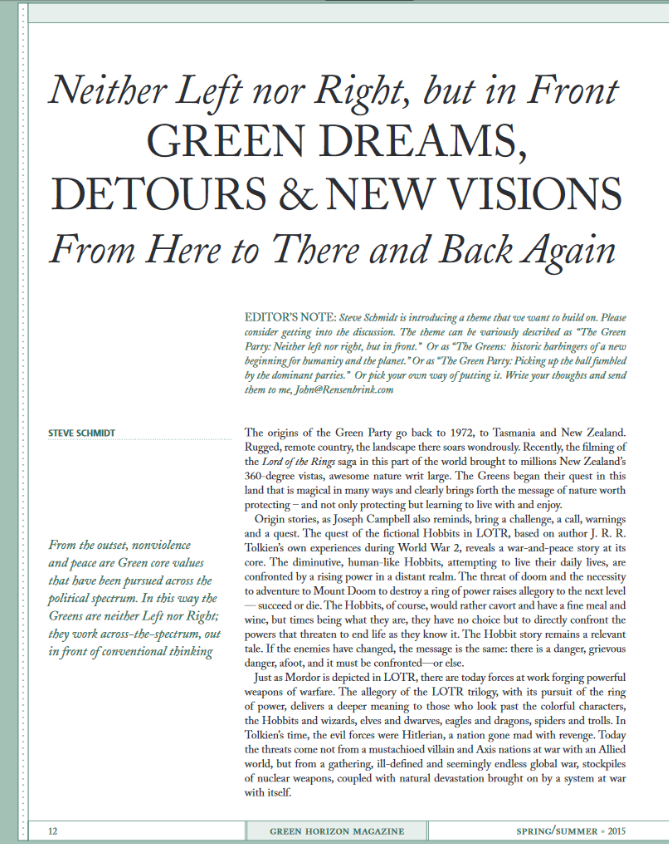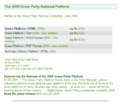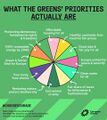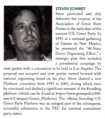Category:Green Party: Difference between revisions
Siterunner (talk | contribs) No edit summary |
Siterunner (talk | contribs) No edit summary |
||
| (16 intermediate revisions by the same user not shown) | |||
| Line 5: | Line 5: | ||
<big>'''Green Parties - International List PDF'''</big> | <big>'''Green Parties - International List PDF'''</big> | ||
(The only political party with an extensive global reach. The Green Party has formed in over 100 countries.) | |||
• http://www.greenpolicy360.net/mw/images/Green_Parties_global_list_June_2014update.pdf | • http://www.greenpolicy360.net/mw/images/Green_Parties_global_list_June_2014update.pdf | ||
| Line 13: | Line 13: | ||
○ | |||
Update: July 2021 | |||
SJS/GreenPolicy360 Siterunner: I was asked recently 'as a person who was a key drafter of the founding U.S. Green Party Platform' to speak to what I felt about changes made to the Platform recently as a faction in the U.S. Green Party changed the party's economic positions and recast the party's designation to an "ecosocialist party". | |||
A central goal of the U.S. Green Party founding platform drafter, continuing for over twenty years since Charlene Spretnak's [https://www.greenpolicy360.net/w/Category:Green_ValuesGreen Values platform writing in the 1980s], is to create an expanded rights agenda, a Green agenda of environmental protection, of diversity and community. The founding goal was to build a "serious, credible political party on a platform serving as a foundation for a serious, credible -- and impactful -- political party in the U.S. and globally. | |||
Here is what the [https://www.greenpolicy360.net/w/Category:Green_Platform founding Green Party Platform] states, as it was officially voted upon, setting in place the founding values and policies of the [https://www.greenpolicy360.net/w/Category:Green_Party U.S. national Green Party.] | |||
Here are a number of quotes from talks I have given about the Platform in the 1990s and since 2000. The intent of the new Green Party through the foundational platform was and is to provide a guide for green politics -- and continue as a factual source for communities online and in person who are looking to explore the Green Party's intent and origins... | |||
''The founding U.S. Green platform believes in values based politics, embodies a "rights agenda", constitutional rights, individual rights, free speech, a free press, freedoms, rights and responsibilities.'' | |||
''Our responsibilities as green citizens, planet citizens, U.S. citizens include acting for the common good and on behalf of [https://www.greenpolicy360.net/w/The_Commons 'the Commons'.]'' | |||
''We see a big picture as planet citizens and, as a political party in over a hundred countries, a diversity of citizenships, communities, and diverse economies...'' | |||
''Stand up for human dignity, raise a banner of human rights.'' | |||
''Step up and advance ecological activism to protect and support a healthy living community.'' | |||
''Advocate for [https://www.greenpolicy360.net/w/Eco-nomics "Eco-nomics"], [https://www.greenpolicy360.net/w/New_Economy_Movement diverse new economics], healthy and thriving communities.'' | |||
''Be a force against bigotry, unfairness, and discrimination.'' | |||
''Support democratic, civic values, the rights of a free and independent press.'' | |||
''Oppose authoritarianism, whether of the the left and right, oppose dictatorships and top down dictatorial politics.'' | |||
''Advance civil rights and voting rights.'' | |||
<big>'''US Green Party / Origins - Platform and Key Values'''</big> | <big>'''US Green Party / Origins - Platform and Key Values'''</big> | ||
:• https://www.greenpolicy360.net/w/Green_Party | :• https://www.greenpolicy360.net/w/Green_Party | ||
| Line 31: | Line 65: | ||
<big><font color=blue> | <big><font color=blue>○ ○ ○ ○ ○ ○ ○ ○ ○</font></big> | ||
Update: 2016 | |||
The takeover of the US Green Party can be traced back to a 'social ecology' activist group, proponents of ideology attached to the work of Murray Bookchin. A cadre of 'Bookchinites' began actions in the mid-1980s intended to takeover the newly formed US Green Party. The cadre persisted in takeover attempts throughout the 1990s and into the 2000s, with the result being the deconstruction of a broader green political party. In 2016 remnants of the Bookchinite faction and others, with a few votes for an amendment to the founding Green Platform, achieved a radical re-definition of the US Green Party. | |||
The GP 'vanguard' with a revolutionary banner would go forward as self-defined "eco-socialists", "anarcho", "green anarchists". | |||
Phrases used by this group, this cadre, are described in a Wikipedia definition of [https://en.wikipedia.org/wiki/Eco-socialism '''"eco-socialism"'''] and [https://en.wikipedia.org/wiki/Green_anarchism '''"green anarchism" '''.] | |||
Wikipedia: ''Eco-socialists are critical of many past and existing forms of both green politics and socialism. They are often described as "Red Greens" – adherents to Green politics with clear anti-capitalist views, often inspired by Marxism (red greens are in contrast to eco-capitalists and green anarchists). The term "watermelon" is commonly applied, often pejoratively, to Greens who seem to put "social justice" goals above ecological ones, implying they are "green on the outside but red on the inside".'' ... | |||
Wikipedia: ''The main tendencies of green anarchism are: social ecology, which argues that environmental issues stem directly from social issues; deep ecology, which critiques anthropocentrism and advocates instead for biocentrism; and anarcho-primitivism, which advocates for the abolition of technology and civilization.'' | |||
In 2016, the U.S. Green Party's turned with the Jill Stein campaign for president away from broad-based green politics and platform-based green politics to an 'anti-Democratic Party', 'give Trump a chance' campaign. (A core influencer of this campaign was, it should be added, the same Bookchinite-activist in the Green Party who pressed Ralph Nader in the 2000 presidential campaign to break commitments not to campaign 'extremely' in Florida in a "swing vote" action. Commitments made by Nader were set aside, as a few anarcho-greens lobbied for a more disruptive campaign. The result in 2000 was an election that enabled a 'stop the vote' action in Miami (a Roger Stone-led [https://en.wikipedia.org/wiki/Brooks_Brothers_riot '''Brooks Brothers Riot'''], as was described at the time, and a momentous, precedent-setting US Supreme Court decision), threw the election results in [https://en.wikipedia.org/wiki/Bush_v._Gore '''Bush v. Gore'''] to George W. Bush. | |||
The radical change in direction for the U.S. Green Party, that acted in part to change US political history, was memorialized in what was described as a 'takeover' of the Green Party by this extreme cadre. The faction that influenced 2000 would soon come out as 'revolutionary'. Self-professed leaders of the so-called revolutionary tactics described themselves as #anarcho #revolutionarysocialists in hashtags and social media organizing. They put together a redo, redefining the U.S. Green Party's foundation platform and values statement and passed this deconstruction/redefinition amendment during the Stein campaign with purposeful intent. The economic diversity, economic justice positions in the Green Platform were replaced by an ideological group of advocates numbering about one hundred. Even as the vote was a small percentage of registered Green Party members (the Green Party US website claims approx. 250,000 green party registered greens in states across the country), the 'spoiler', 'block it and break it' politics, of this cadre, due to ballot access across the US arranged by Greens who had no relation with the Bookchinites, not was turned by the radical faction to their purposes. | |||
The replacement of the economic positions of the U.S. Green Party was decided in an 'amendment' to the founding Green Party Platform, a vote described as by approx. 100 of 250,000 Green registered members. | |||
The | The questions immediately raised about the democratic extent of this vote to re-make the basic beliefs and values of the U.S. Green Party were lost as the cadre that pushed the profound change prevailed. The amendment noted that 'expropriation' of property was not immediately being called for. After years of work, outreach and discussion, debate and decisions from 1994 through to the founding platform in 2000, it bears emphasis that one hundred or so changed the foundation of US Green Party, in August 2016, from economic diversity and emphasis on economic justice in the 'real world' to another world view. | ||
Economics of diversity, though widely supported, was rejected and replaced with a professed "Ideology" of "anti-capitalism" and "eco-socialism" (although these terms were not debated in the amendment to change the Green Platform.) Jill Stein set off in her campaign in an attack on the Democratic Party and she and her campaign begin to speak of 'giving Trump a chance'... the U.S. Green Party imploded. | |||
Online and [https://en.wikipedia.org/wiki/Green_Party_of_the_United_States in Wikipedia], unnamed persons began in 2017 to re-label the US Green Party's "Ideology" as revolutionary, anarchist, and intended to end 'late-stage capitalism'. | |||
The convoluted history of the US Green Party, at this point, began to radically shift back to the former structure of what was known as tG/GPUSA prior to the Bookchinite-group's demise in the 1990s. | |||
Although the 2016 restructuring vote was challenged by many experienced Green Party members, the restricted amendment passed by about a hundred in the heat of the Stein campaign against Hillary Clinton and support among some for a Donald Trump option. | |||
In 2018, one of the long-time players in the group that worked to restructure the national Green Party announced plans to run for the Green Party nomination for president, and to aim at a swing state strategy designed to take away votes from the Democratic candidate. | |||
The question of the future Green Party politics crossed over into practical vs. ideological politics. | |||
Latest revision as of 14:07, 10 September 2023
Green Parties - International List PDF
(The only political party with an extensive global reach. The Green Party has formed in over 100 countries.)
• http://www.greenpolicy360.net/mw/images/Green_Parties_global_list_June_2014update.pdf
○
Update: July 2021
SJS/GreenPolicy360 Siterunner: I was asked recently 'as a person who was a key drafter of the founding U.S. Green Party Platform' to speak to what I felt about changes made to the Platform recently as a faction in the U.S. Green Party changed the party's economic positions and recast the party's designation to an "ecosocialist party".
A central goal of the U.S. Green Party founding platform drafter, continuing for over twenty years since Charlene Spretnak's Values platform writing in the 1980s, is to create an expanded rights agenda, a Green agenda of environmental protection, of diversity and community. The founding goal was to build a "serious, credible political party on a platform serving as a foundation for a serious, credible -- and impactful -- political party in the U.S. and globally.
Here is what the founding Green Party Platform states, as it was officially voted upon, setting in place the founding values and policies of the U.S. national Green Party.
Here are a number of quotes from talks I have given about the Platform in the 1990s and since 2000. The intent of the new Green Party through the foundational platform was and is to provide a guide for green politics -- and continue as a factual source for communities online and in person who are looking to explore the Green Party's intent and origins...
The founding U.S. Green platform believes in values based politics, embodies a "rights agenda", constitutional rights, individual rights, free speech, a free press, freedoms, rights and responsibilities.
Our responsibilities as green citizens, planet citizens, U.S. citizens include acting for the common good and on behalf of 'the Commons'.
We see a big picture as planet citizens and, as a political party in over a hundred countries, a diversity of citizenships, communities, and diverse economies...
Stand up for human dignity, raise a banner of human rights.
Step up and advance ecological activism to protect and support a healthy living community.
Advocate for "Eco-nomics", diverse new economics, healthy and thriving communities.
Be a force against bigotry, unfairness, and discrimination.
Support democratic, civic values, the rights of a free and independent press.
Oppose authoritarianism, whether of the the left and right, oppose dictatorships and top down dictatorial politics.
Advance civil rights and voting rights.
US Green Party / Origins - Platform and Key Values
○ ○ ○ ○ ○ ○ ○ ○ ○
Update: 2016
The takeover of the US Green Party can be traced back to a 'social ecology' activist group, proponents of ideology attached to the work of Murray Bookchin. A cadre of 'Bookchinites' began actions in the mid-1980s intended to takeover the newly formed US Green Party. The cadre persisted in takeover attempts throughout the 1990s and into the 2000s, with the result being the deconstruction of a broader green political party. In 2016 remnants of the Bookchinite faction and others, with a few votes for an amendment to the founding Green Platform, achieved a radical re-definition of the US Green Party.
The GP 'vanguard' with a revolutionary banner would go forward as self-defined "eco-socialists", "anarcho", "green anarchists".
Phrases used by this group, this cadre, are described in a Wikipedia definition of "eco-socialism" and "green anarchism" .
Wikipedia: Eco-socialists are critical of many past and existing forms of both green politics and socialism. They are often described as "Red Greens" – adherents to Green politics with clear anti-capitalist views, often inspired by Marxism (red greens are in contrast to eco-capitalists and green anarchists). The term "watermelon" is commonly applied, often pejoratively, to Greens who seem to put "social justice" goals above ecological ones, implying they are "green on the outside but red on the inside". ...
Wikipedia: The main tendencies of green anarchism are: social ecology, which argues that environmental issues stem directly from social issues; deep ecology, which critiques anthropocentrism and advocates instead for biocentrism; and anarcho-primitivism, which advocates for the abolition of technology and civilization.
In 2016, the U.S. Green Party's turned with the Jill Stein campaign for president away from broad-based green politics and platform-based green politics to an 'anti-Democratic Party', 'give Trump a chance' campaign. (A core influencer of this campaign was, it should be added, the same Bookchinite-activist in the Green Party who pressed Ralph Nader in the 2000 presidential campaign to break commitments not to campaign 'extremely' in Florida in a "swing vote" action. Commitments made by Nader were set aside, as a few anarcho-greens lobbied for a more disruptive campaign. The result in 2000 was an election that enabled a 'stop the vote' action in Miami (a Roger Stone-led Brooks Brothers Riot, as was described at the time, and a momentous, precedent-setting US Supreme Court decision), threw the election results in Bush v. Gore to George W. Bush.
The radical change in direction for the U.S. Green Party, that acted in part to change US political history, was memorialized in what was described as a 'takeover' of the Green Party by this extreme cadre. The faction that influenced 2000 would soon come out as 'revolutionary'. Self-professed leaders of the so-called revolutionary tactics described themselves as #anarcho #revolutionarysocialists in hashtags and social media organizing. They put together a redo, redefining the U.S. Green Party's foundation platform and values statement and passed this deconstruction/redefinition amendment during the Stein campaign with purposeful intent. The economic diversity, economic justice positions in the Green Platform were replaced by an ideological group of advocates numbering about one hundred. Even as the vote was a small percentage of registered Green Party members (the Green Party US website claims approx. 250,000 green party registered greens in states across the country), the 'spoiler', 'block it and break it' politics, of this cadre, due to ballot access across the US arranged by Greens who had no relation with the Bookchinites, not was turned by the radical faction to their purposes.
The replacement of the economic positions of the U.S. Green Party was decided in an 'amendment' to the founding Green Party Platform, a vote described as by approx. 100 of 250,000 Green registered members.
The questions immediately raised about the democratic extent of this vote to re-make the basic beliefs and values of the U.S. Green Party were lost as the cadre that pushed the profound change prevailed. The amendment noted that 'expropriation' of property was not immediately being called for. After years of work, outreach and discussion, debate and decisions from 1994 through to the founding platform in 2000, it bears emphasis that one hundred or so changed the foundation of US Green Party, in August 2016, from economic diversity and emphasis on economic justice in the 'real world' to another world view.
Economics of diversity, though widely supported, was rejected and replaced with a professed "Ideology" of "anti-capitalism" and "eco-socialism" (although these terms were not debated in the amendment to change the Green Platform.) Jill Stein set off in her campaign in an attack on the Democratic Party and she and her campaign begin to speak of 'giving Trump a chance'... the U.S. Green Party imploded.
Online and in Wikipedia, unnamed persons began in 2017 to re-label the US Green Party's "Ideology" as revolutionary, anarchist, and intended to end 'late-stage capitalism'.
The convoluted history of the US Green Party, at this point, began to radically shift back to the former structure of what was known as tG/GPUSA prior to the Bookchinite-group's demise in the 1990s.
Although the 2016 restructuring vote was challenged by many experienced Green Party members, the restricted amendment passed by about a hundred in the heat of the Stein campaign against Hillary Clinton and support among some for a Donald Trump option.
In 2018, one of the long-time players in the group that worked to restructure the national Green Party announced plans to run for the Green Party nomination for president, and to aim at a swing state strategy designed to take away votes from the Democratic candidate.
The question of the future Green Party politics crossed over into practical vs. ideological politics.
○
US Green Party Platform
Founding Platform (2000)
Current Platform
○ ○ ○ ○ ○ ○ ○ ○ ○ ○ ○ ○ ○ ○ ○ ○ ○ ○ ○ ○ ○
Collection of Green Party documents
@Scribd
• https://www.scribd.com/collections/4165209/Green-Party-of-the-US
○ ○ ○ ○ ○ ○ ○ ○ ○ ○ ○ ○ ○ ○ ○ ○ ○ ○ ○ ○ ○
National US Green Party Legal Status
The 2001 filing for official status as a national Green Committee and Party produced an FEC Advisory Opinion. A team of Green Party members compiled the over 200 page request with accompanying factual detail of Green Party campaigns/candidates and attached the founding platform of the US Green Party. The Federal Election Commission reference to the Green Party positions and policies was cited as a key element in the FEC's determination to grant legal status as a national committee of a national party.
As an advocate for the formation of a new Green Party over the years, and key platform drafter, your Siterunner pressed for opening up debate in the nation and bringing "serious, credible, platform-based" positions forward to challenge and extend the policies of the two-party system.
The Federal Election Committee agreed that the US Green Party was ready for official standing:
FEC (from the Advisory opinion):... the (Green) Party has already undertaken significant party building activity of a national scope. The various party registration and get-out-the vote-activities, the holding of a national convention in 2000, as well as efforts to publicize the Party’s positions, indicate that the Green Party of the United States is engaging in activity comparable to other national party committees.
• http://www.greenpolicy360.net/w/File:Green_Party_FEC_Advisory_Opinion_2001-13_Nov_2001.pdf / FEC response - Nov 2001
○ ○ ○ ○ ○ ○ ○ ○ ○ ○ ○
Green Party Vision
• http://www.greenpolicy360.net/w/Category:Green_Platform
• http://www.greenpolicy360.net/w/Category:Green_Politics
• http://www.greenpolicy360.net/w/Category:Green_Values
○
○
Subcategories
This category has the following 5 subcategories, out of 5 total.
E
G
N
Pages in category "Green Party"
The following 15 pages are in this category, out of 15 total.
D
Media in category "Green Party"
The following 90 files are in this category, out of 90 total.
- 2000GreenPartyPlatform.pdf ; 318 KB
- A Ukraine Russia US Nato fix.png 800 × 519; 275 KB
- About the Doomsday Clock.png 361 × 415; 56 KB
- AOC March 26, 2019.jpg 597 × 433; 58 KB
- B-21 Raider.jpg 789 × 515; 98 KB
- Blinken-Lavrov - Jan 21 2022.jpg 600 × 600; 117 KB
- Caroline Lucas-Green New Deal.jpg 584 × 391; 71 KB
- Caroline Lucas.jpg 640 × 296; 43 KB
- Conflict-Resolution.png 500 × 360; 127 KB
- David-brower-environmental-movement-cover.jpg 530 × 800; 89 KB
- Doomsday Clock - January 2023.png 784 × 767; 519 KB
- Doomsday Clock 2023.png 622 × 600; 184 KB
- Earth Breathing.jpg 800 × 450; 117 KB
- Eco-feminism-nature.png 365 × 365; 84 KB
- Eco-Nomics.png 262 × 90; 8 KB
- European Greens - Baerbock - Candidate for German Chancellorship.jpg 513 × 185; 37 KB
- European Greens EGPCongress Dec 2022.png 800 × 745; 640 KB
- German foreign minister Baerbock calls for end of nukes.png 579 × 480; 377 KB
- German foreign minister Baerbock on nuclear non proliferation.jpg 541 × 480; 57 KB
- German foreign minister travels to India.png 640 × 178; 115 KB
- GH1 sm.jpg 289 × 84; 10 KB
- Global Green New Deal.jpg 427 × 640; 32 KB
- Green New Deal - Bloomberg Jan 29,2019.png 640 × 757; 589 KB
- Green New Deal - Resolution.pdf ; 55 KB
- Green Parties - International Listing Nov2013 .jpg 454 × 63; 9 KB
- Green Party Platform US founding docs.png 552 × 468; 35 KB
- Green Party US Early History 1984-2001.png 925 × 997; 294 KB
- Green Politics s.png 334 × 75; 11 KB
- Green-Blue s.jpg 240 × 67; 10 KB
- Green-Blue.jpg 773 × 215; 52 KB
- Greeneuropeanjournal.eu.jpg 485 × 237; 30 KB
- GreenPartyplatform cover of founding-platdoc-2000 s.png 306 × 394; 10 KB
- GreenPartyPlatform drafting in Santa Fe 1996 .png 768 × 840; 368 KB
- Greens EU 2024.jpg 480 × 540; 91 KB
- Grn Parties international list cover-2014.png 771 × 819; 589 KB
- I don't think he's bluffing 2.png 448 × 380; 77 KB
- John Rensenbrink - Green Horizon Magazine - Fall 2022.png 480 × 631; 569 KB
- Message from the California Governor Brown.jpg 735 × 350; 76 KB
- Neither left nor right, but in front.png 669 × 844; 359 KB
- New Definitions of National Security demanded - January 2022.png 288 × 146; 21 KB
- New German government announces far reaching climate plans.png 632 × 600; 446 KB
- NPT - Aug 2022.PNG 451 × 664; 147 KB
- Nuclear sole authority of the US president.jpg 718 × 745; 120 KB
- Nuclear Threats and Responses.png 724 × 448; 138 KB
- Nuclear war - small nukes are a misnomer - Potsdam.png 480 × 505; 442 KB
- Nuclear War, A Scenario.png 600 × 661; 571 KB
- Nuclear Weapons proliferation - 2024 News.jpg 600 × 688; 158 KB
- Nuclear Weapons proliferation - 2024.jpg 600 × 613; 126 KB
- Nuclear Weapons testing again...May 2020... madness.jpg 567 × 493; 78 KB
- Nuclear-War-A-Scenario-272x300.jpg 272 × 300; 15 KB
- Nukes put on high alert.png 640 × 267; 85 KB
- Protect Democracy.png 775 × 600; 727 KB
- Russia-US intermediate range nuclear forces treaty-INF in danger.png 629 × 480; 245 KB
- Russian Orthodox Church Patriarch Kirill.png 640 × 329; 93 KB
- Sagan - re nuclear weapons gambling.jpg 680 × 397; 76 KB
- SJS 1994 NM Green Lt Gov campaign.jpg 278 × 414; 15 KB
- Spend Russia and China into oblivion.jpg 608 × 303; 43 KB
- Steven J Schmidt, May 2023.png 363 × 484; 383 KB
- StratDem Proposed Russia-Ukraine Fix.png 480 × 535; 126 KB
- Strategic Demands - Featured Pages.png 430 × 270; 26 KB
- Sunflowers Ukraine.jpg 799 × 759; 275 KB
- The Movement and the 'Madman' - 2023.png 768 × 813; 582 KB
- The Movement and the Madman - 2.jpg 600 × 746; 148 KB
- The Spiritual Dimension of Green Politics.jpg 222 × 346; 20 KB
- Too hot Europe 2023-06-27.png 480 × 574; 300 KB
- Treaty to Prohibit Nuclear Weapons - Oct 2020.jpg 517 × 709; 90 KB
- Ukraine tension January 21 2022.png 684 × 209; 46 KB
- UN General Assembly Vote - March 2 2022.jpg 680 × 417; 107 KB
- Vietnam Moratorium Committee-Documentary Intro.jpg 640 × 392; 34 KB
- War in the Ukraine - February 24 2022.png 731 × 307; 118 KB
- War in Ukraine Feb 26 2022.png 640 × 195; 68 KB
- War or Security - January 2022.png 448 × 231; 77 KB
- When your house is on fire.jpg 589 × 473; 77 KB
- Winona laduke.jpg 300 × 399; 95 KB
- Zelenskyy says.png 640 × 181; 98 KB




































































